Defences
1/25
There's no tags or description
Looks like no tags are added yet.
Name | Mastery | Learn | Test | Matching | Spaced |
|---|
No study sessions yet.
26 Terms
What is the general position on intoxication as a defence?
[R v Kingston]
It is not a defence to state only committed offence due to intoxication.
D given spiked coffee. Performed indecent assault on young boy.
Held - Guilty. Drugged intent still intent. Satisfy AR and MR.
Defence if intoxication overwhelms D so as to lack MR entirely.
What are the two stages to determine if the defendant can rely on intoxication?
Was intoxication voluntary or involuntary?
Was the offence of basic or specific intent?
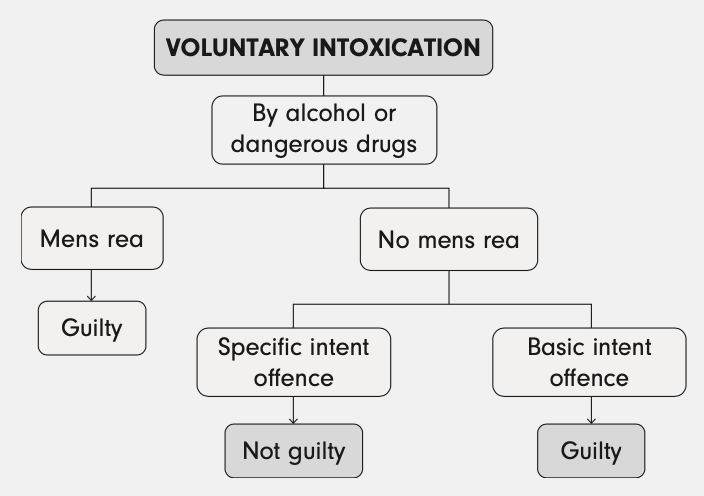
What is a specific intent offence?
MR is intention. Nothing else. Excludes recklessness.
Offences: Murder, assault GBH, theft.
What is a basic intent offence?
MR includes intention or recklessness.
Offences: Assault causing actual bodily harm, unlawful act MS, assault and battery, criminal damage.
True or False: If a defendant voluntarily consumes an intoxicant which they do not know is stronger or more pure than realised then they are still liable for the commission of an offence.
True.
D aware taking drugs, but strength unknown? Intoxication is still considered voluntary.
What is the position on voluntary intoxication as a defence to crimes of basic intent?
[DPP v Majewski]
Not a defence.
Voluntary consumption of substance is evidence of recklessness.
What is the position on voluntary intoxication as a defence to crimes of specific intent?
[R v Lipman]
Viable defence. D so intoxicated so as to be unable form MR.
D took LSD. Paranoid hallucinations. Suffocated victim.
Held - Lack MR for murder. Unable prove intent to kill / cause GBH.
*NOTE - Lack MR for murder, but not MS.
MS is crime of basic intent. Intoxication is not defence here.
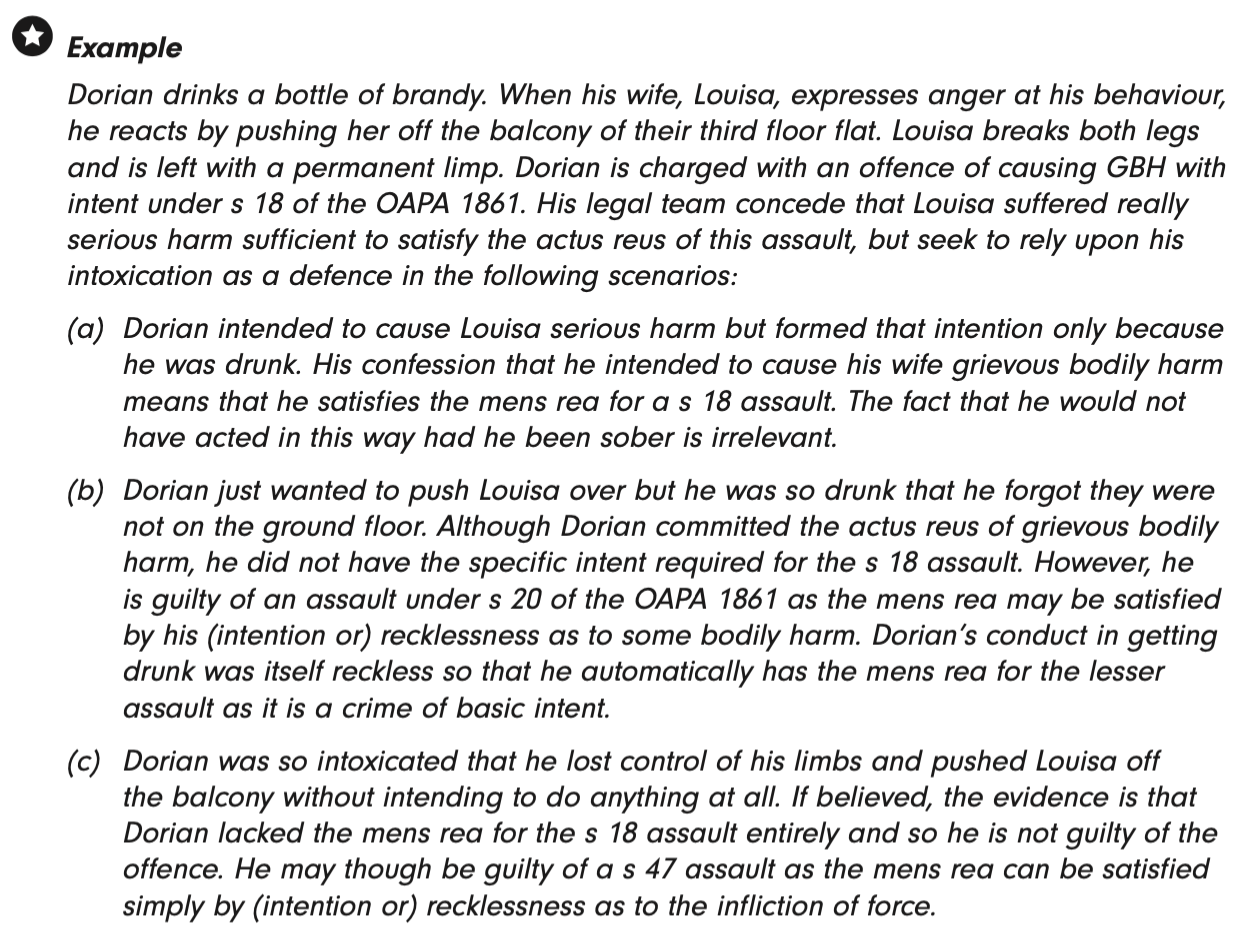
What amounts to involuntary intoxication?
Spiked drink when on night out.
Voluntarily take prescribed drug. Causes unpredictable / aggressive behaviour.
Jury must decide if taking prescribed drug was reckless (i.e. someone else’s prescription).
What is the legal effect of a finding that someone was involuntarily intoxicated during the offence?
May be defence to crimes of basic and specific intent. But only if lack MR.
If clear evidence of MR then defence fails.
Example - Callum throws brick at window on the way home from a pub. Involuntarily intoxicated as a result of friends adding vodka to drink. He accepts he acted deliberately, but claims he would never act that way had drink not been spiked.
Callum’s defence of involuntary intoxication will fail. Had MR to commit criminal damage. He knew what he was doing.
See attached for alternative example of involuntary intoxication succeeding.

Is ‘Dutch courage’ a valid intoxication defence?
[AG for NI v Gallagher]
Husband resolve to kill wife; drank bourbon bottle.
Stabbed her to death. Argued lack MR for offence due to intoxication.
Held - Guilty murder.
No coincidence of MR and AR (i.e. MR formed before offence).
Public policy to convict because otherwise consuming alcohol would be valid defence.
If a person is intoxicated, but only commits a crime of basic intent due to being mistaken about the circumstances as a result - does this operate as a defence?
[R v O’Grady]
No.
Voluntary intoxication = Recklessness. Cannot rely on mistakes of perception as a result.
Contrast with self-defence (i.e. judged on facts as they believed them to be).
D and victim consume lots of alcohol. Go to D’s apartment. Fight occurred.
Woke up to victim dead in apartment. D argue honest belief of attack.
Held - MS conviction upheld. Voluntary act of intoxication. Cannot rely on mistakes.
How does intoxication impact the defence of lawful excuse under criminal damage and arson?
Lawful excuse = D honest belief owner consent or would have consented to damage if knew of circumstances.
Irrelevant if D intoxicated when arrived at genuine belief.
***Effect?
D commits criminal damage in mistaken (but drunken) belief that owner consents; won’t be convicted.
D commits assault in mistaken (but drunken) belief they are being attacked; will be convicted.
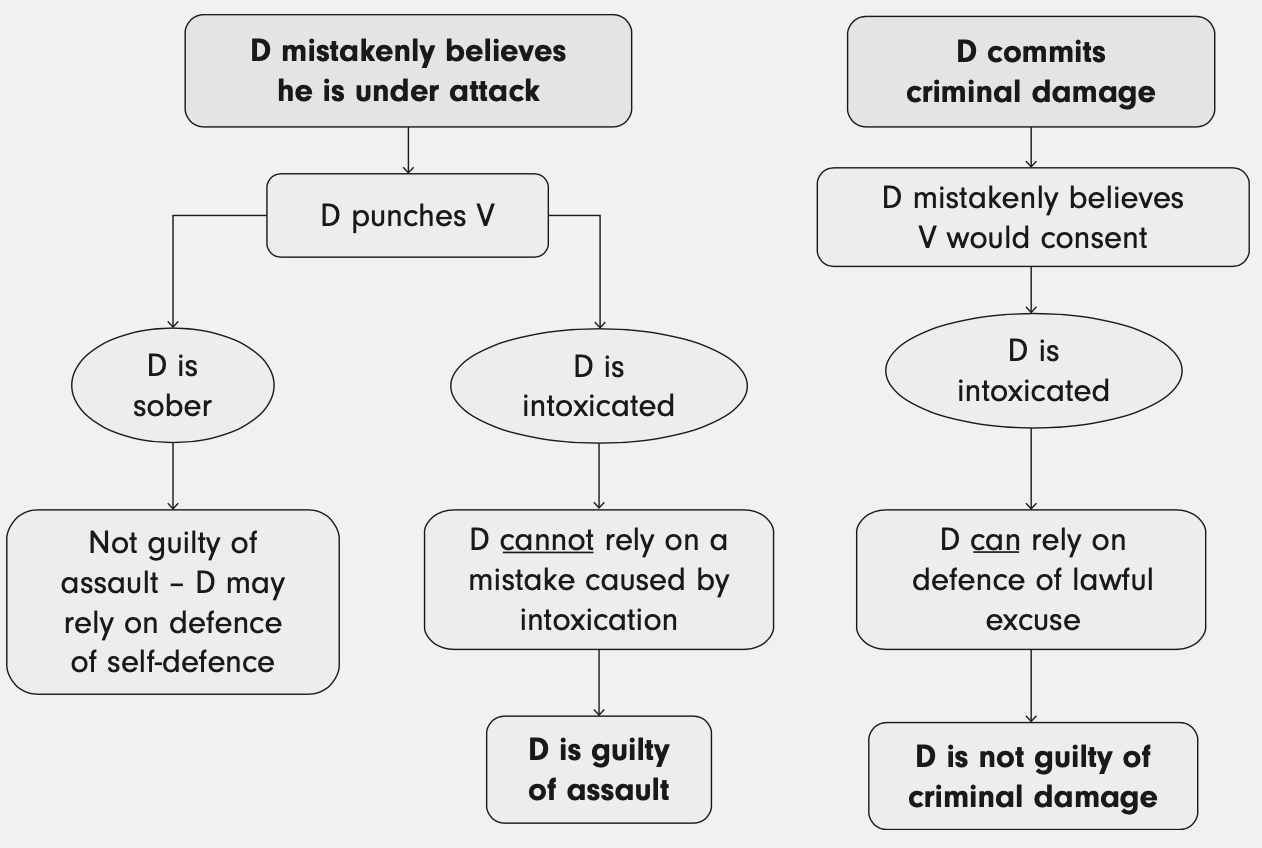
What is the definition of self-defence under s. 3, Criminal Law Act 1967?
Use such force as is reasonable in the circumstances to prevent crime, assist lawful arrest of suspected offenders or persons unlawfully at large.
Extend to defending yourself, others and property.
Key term = Reasonable force. Assessed on person’s subjective belief.
Evidential burden to raise it on D (i.e. put it to PR’s witness in cross-examination, D raise it in witness box).
Effect? PR must disprove BRD.
Does the defence of self-defence extend to situations where the D had a mistaken belief as to the circumstances?
[Williams (Gladstone)]
Yes.
M witness youth steal woman’s handbag. Chased youth; knocked to ground.
D witness last act. Punched M in face. Honest belief defend youth.
Held - Self-defence founded. Honestly held belief.
NOTE - D judged on facts as they believed them to be (subjective); applies even if unreasonable; jury may decide belief not honestly held if unreasonable.
So…honest belief not a total escape.
Does self-defence apply where the D has a mistaken belief due to voluntary intoxication?
No.
See R v O’Grady earlier.
BUT - If D’s intoxication is involuntary then can rely upon mistaken belief under self-defence (see attached).
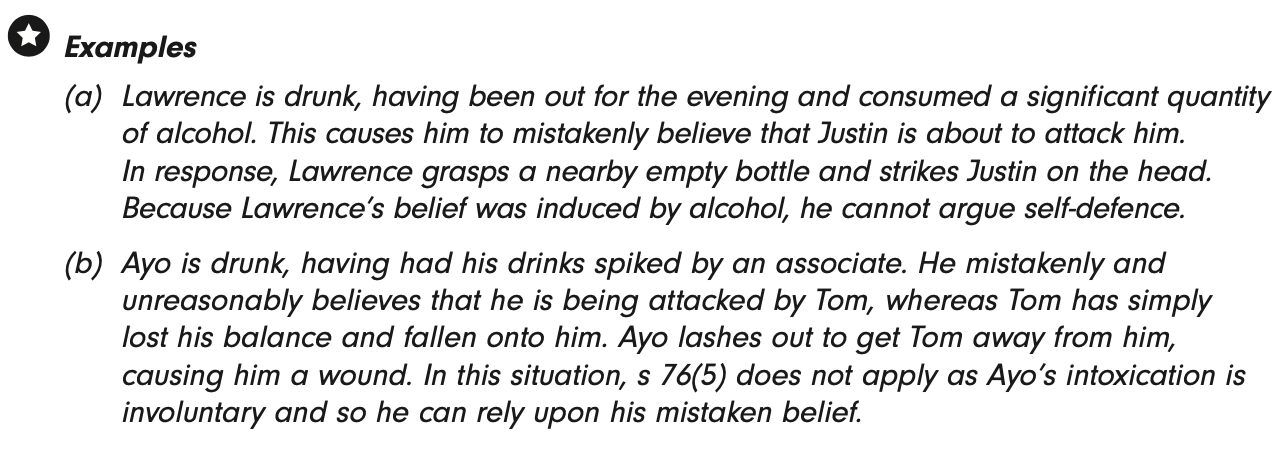
True or False: The judge in the Crown Court or the Magistrates are responsible for determining if the force used was reasonable.
False.
Question of fact.
Decided by jury in CC or magistrates in MC.
Depend on: Seriousness of offence, degree of force to defend property.
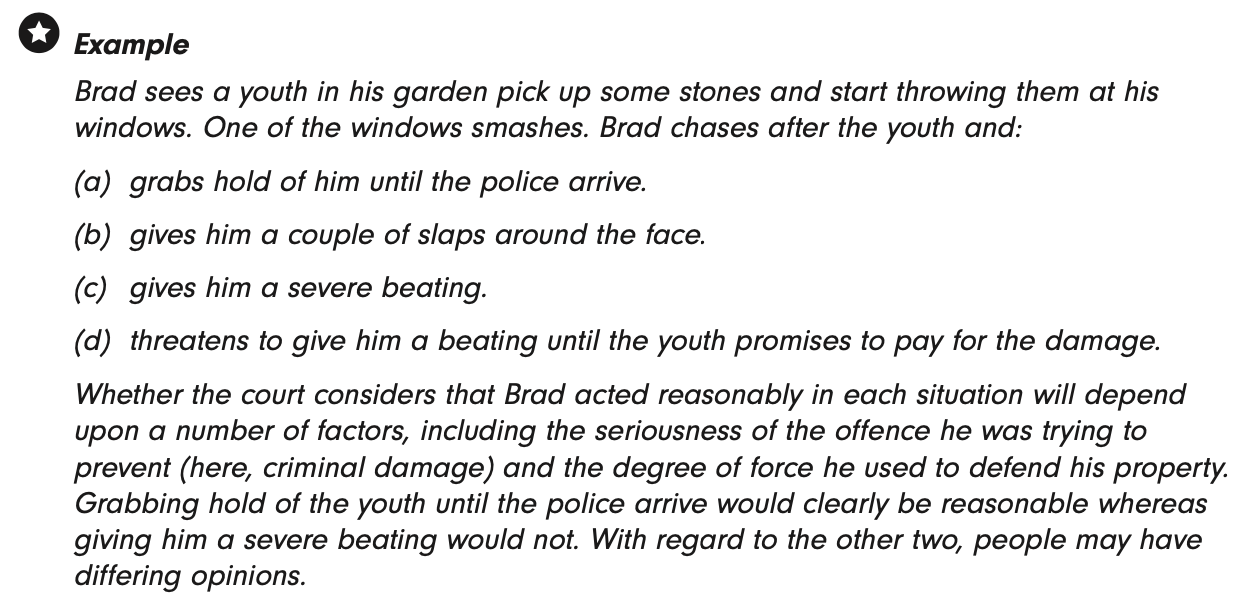
On what basis is the D judged in using reasonable force?
Judged on basis of facts as they honestly and genuinely believed them to be.
So…if victim was planning on committing an offence, but not readily apparent then D cannot rely on this for self-defence (see example).
NOTE - Reasonableness of belief is relevant to whether it was genuinely held.

What does ‘reasonable force’ mean?
[R v Clegg]
Won’t be reasonable if disproportionate in the circumstances as D believed them to be.
D (soldier) fired 3 rounds at car driven towards him.
Fired 1 fatal shot after car passed by.
Held - Disproportionate. Danger over. First 3 shots were reasonable. Last was not.
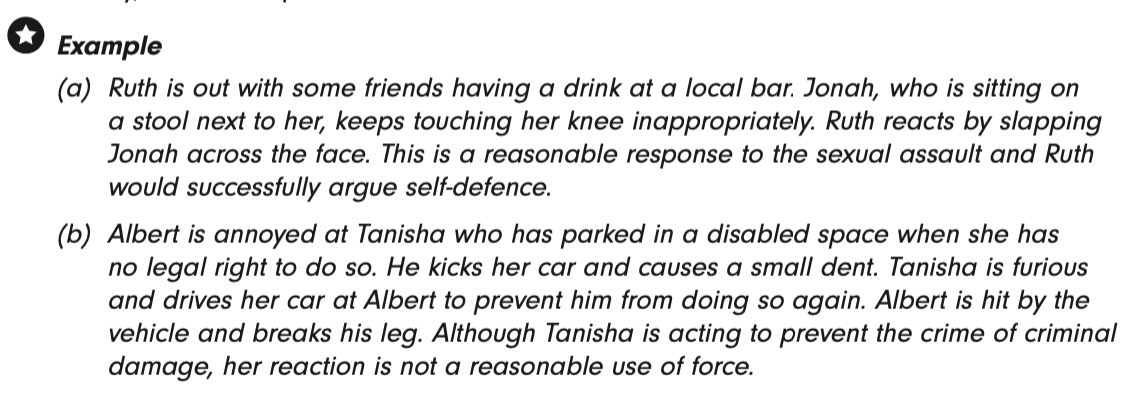
What is the test for reasonableness of force?
Objective test. Decided by jury / magistrates.
Was force reasonable in circumstances as D honestly and genuinely believed them to be?
What aspects of the D’s characteristics (i.e. physical or mental) are relevant in determining if they acted reasonably?
Physical characteristics only (i.e. threat against frail old lady greater than youth).
Mental characteristics are not relevant (i.e. cannot cite mental health diagnoses).
What is the different test for reasonable and proportionate force in householder cases of self-defence?
‘…degree of force used…is not to be regarded as having been reasonable in the circumstances as they believed them to be if it was grossly disproportionate’.
HH can use more than proportionate force (i.e. greater leeway).
What is a householder for the purposes of self-defence?
D uses force in self-defence or defence of another while in or partly in:
Building or part that is dwelling.
Forces accommodation;
Vehicle / vessel that is dwelling.
D need not be actual homeowner.
Valid so long as not trespasser and in dwelling.
NOTE - Key term is ‘dwelling’. Not commercial premises. Look at attached.
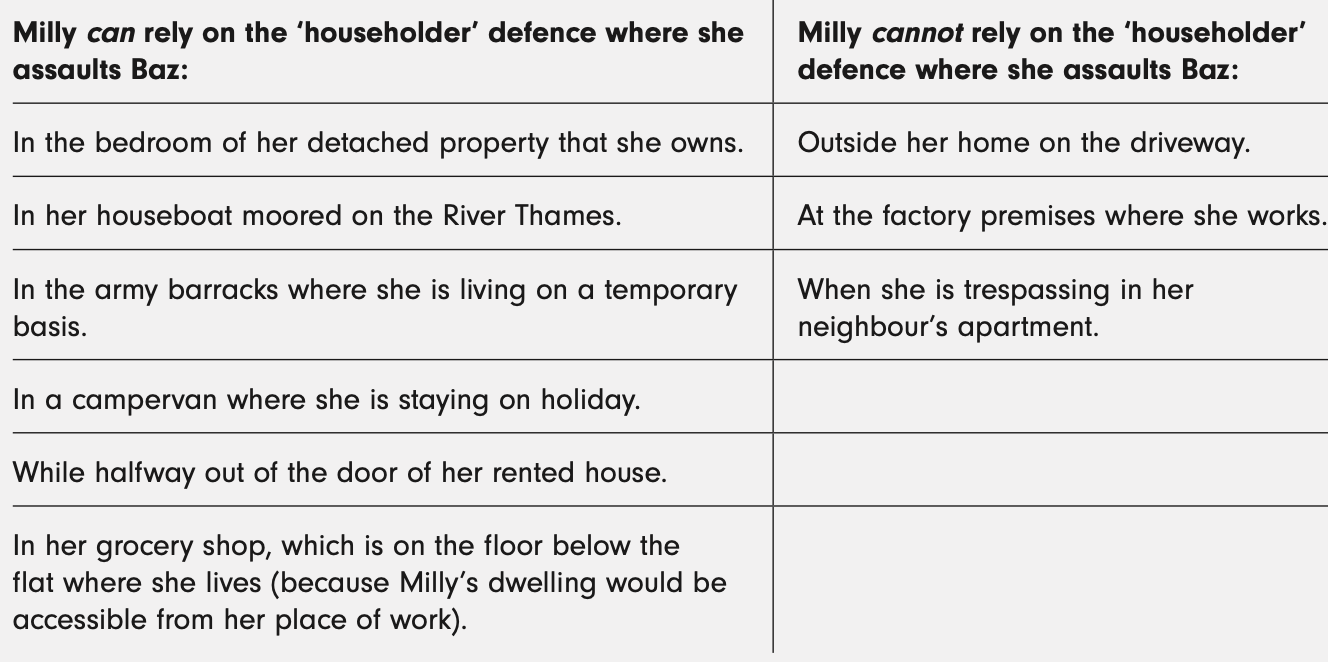
When is force used ‘grossly disproportionate’?
[R (Collins) v Secretary of State for Justice]
Difficult to state conclusively.
C suffer serious injury restrained in headlock after unlawful entry.
CPS declined to prosecute HH.
Held - Court opined reasonable given particular circumstances.
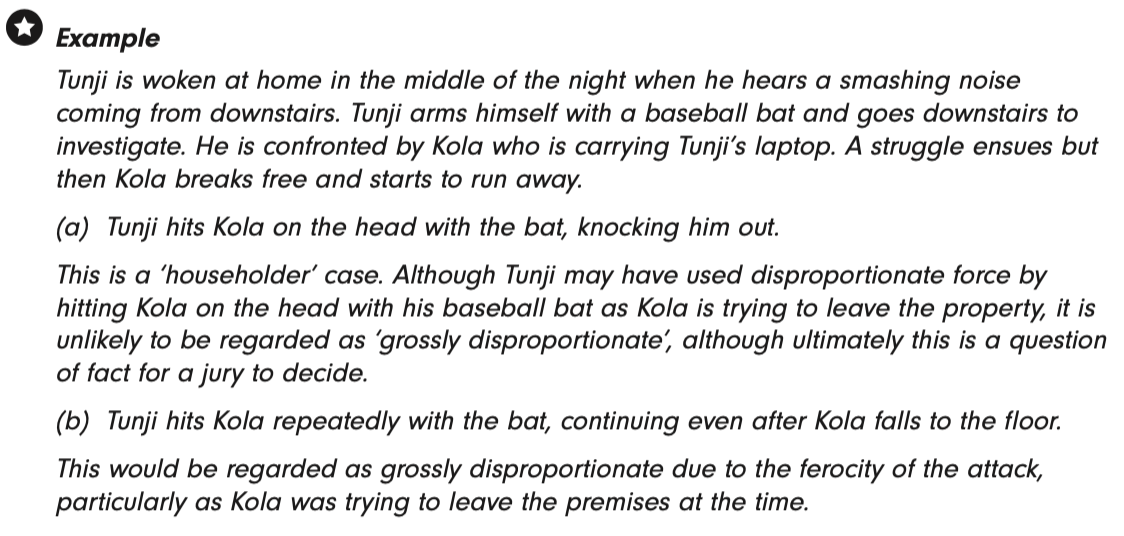
True or False: There is no duty to retreat under self-defence.
True.
But opportunity to retreat used to assess if reasonable force used.
Will a ‘heat of the moment’ reaction by the D factor into their claim of self-defence?
Yes.
Factored into deciding if D acted reasonably:
Person acting for legitimate purpose may be unable to weigh up exact necessary action.
Person only doing what honestly and instinctively thought necessary…strong evidence only reasonable action taken.

Does self-defence allow for a pre-emptive strike?
[Beckford v R]
Yes.
D (police officer) sent to house reports of gun use.
Shot person fleeing house. Believed to be armed. No gun found.
Held - Self-defence. Do not need to wait for person to shoot first. Circumstances may justify pre-emptive strike.
NOTE - Danger must be specific / imminent to justify this.